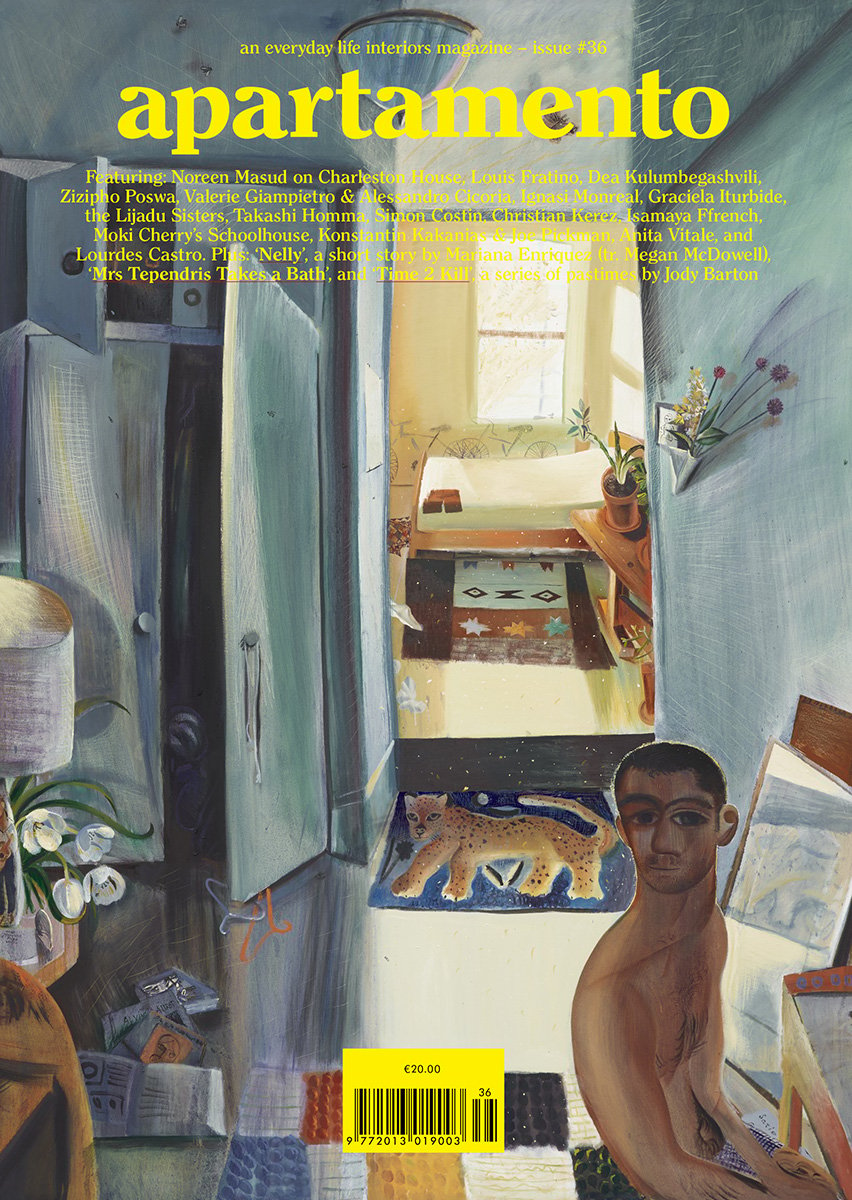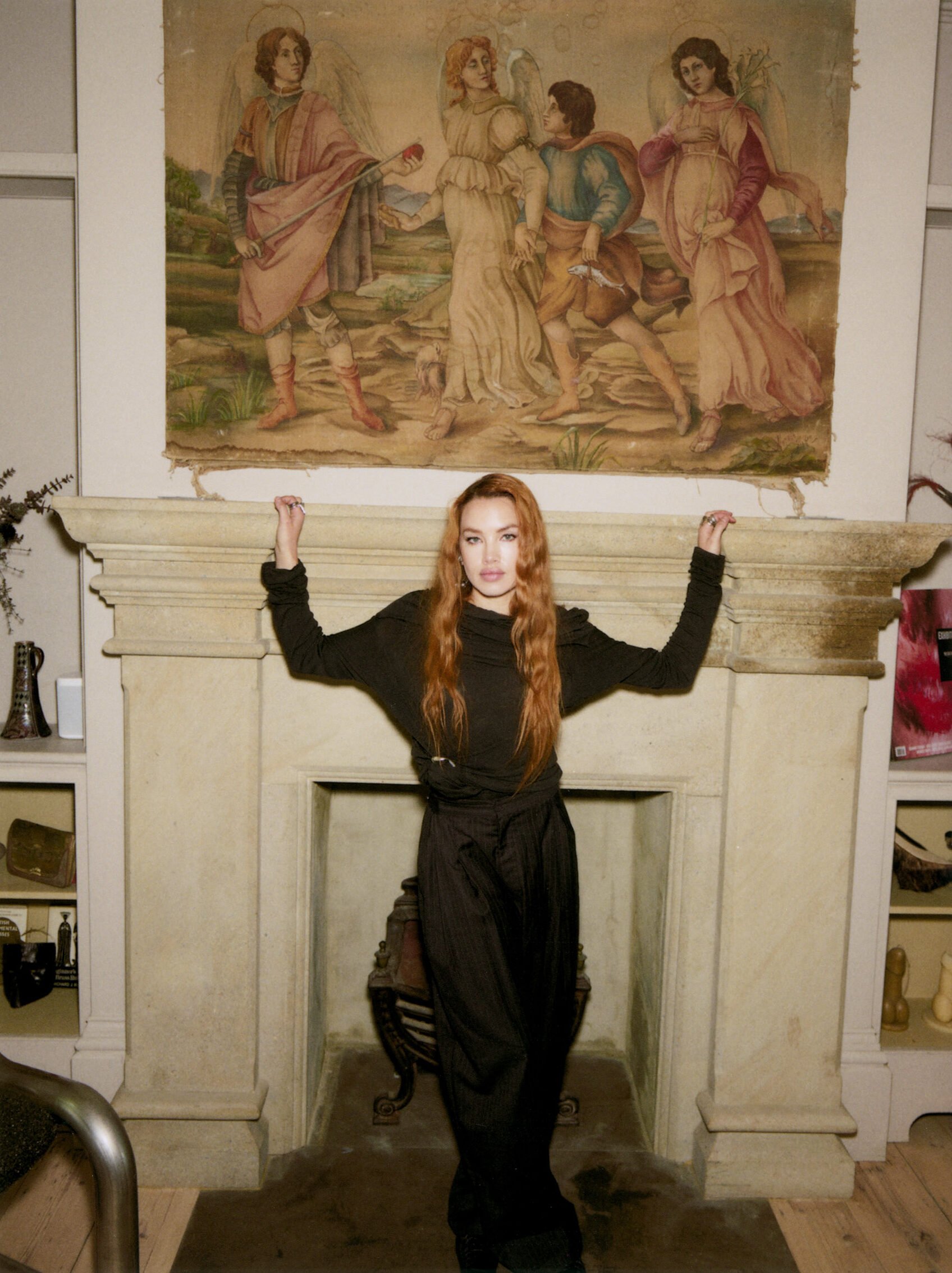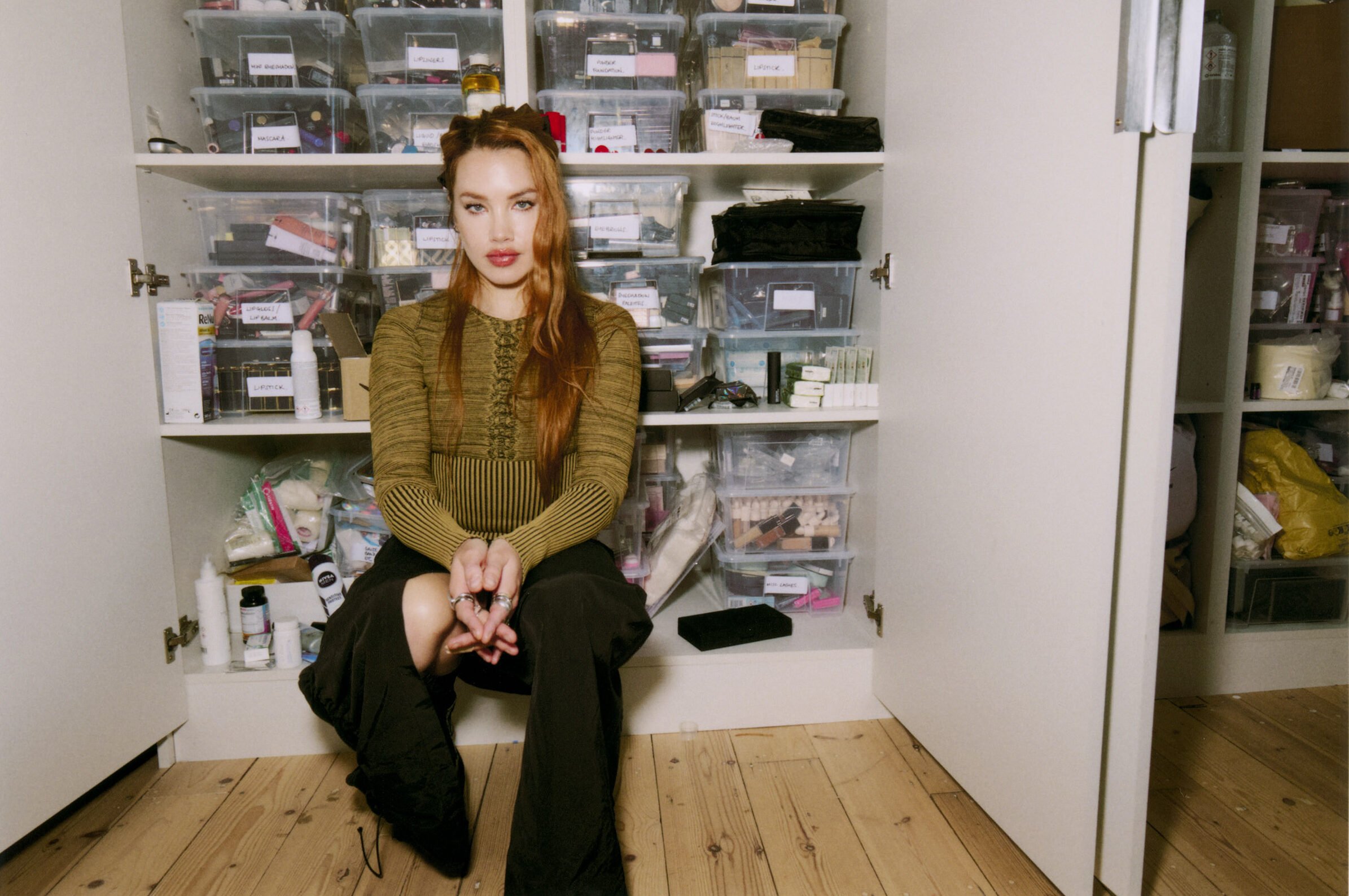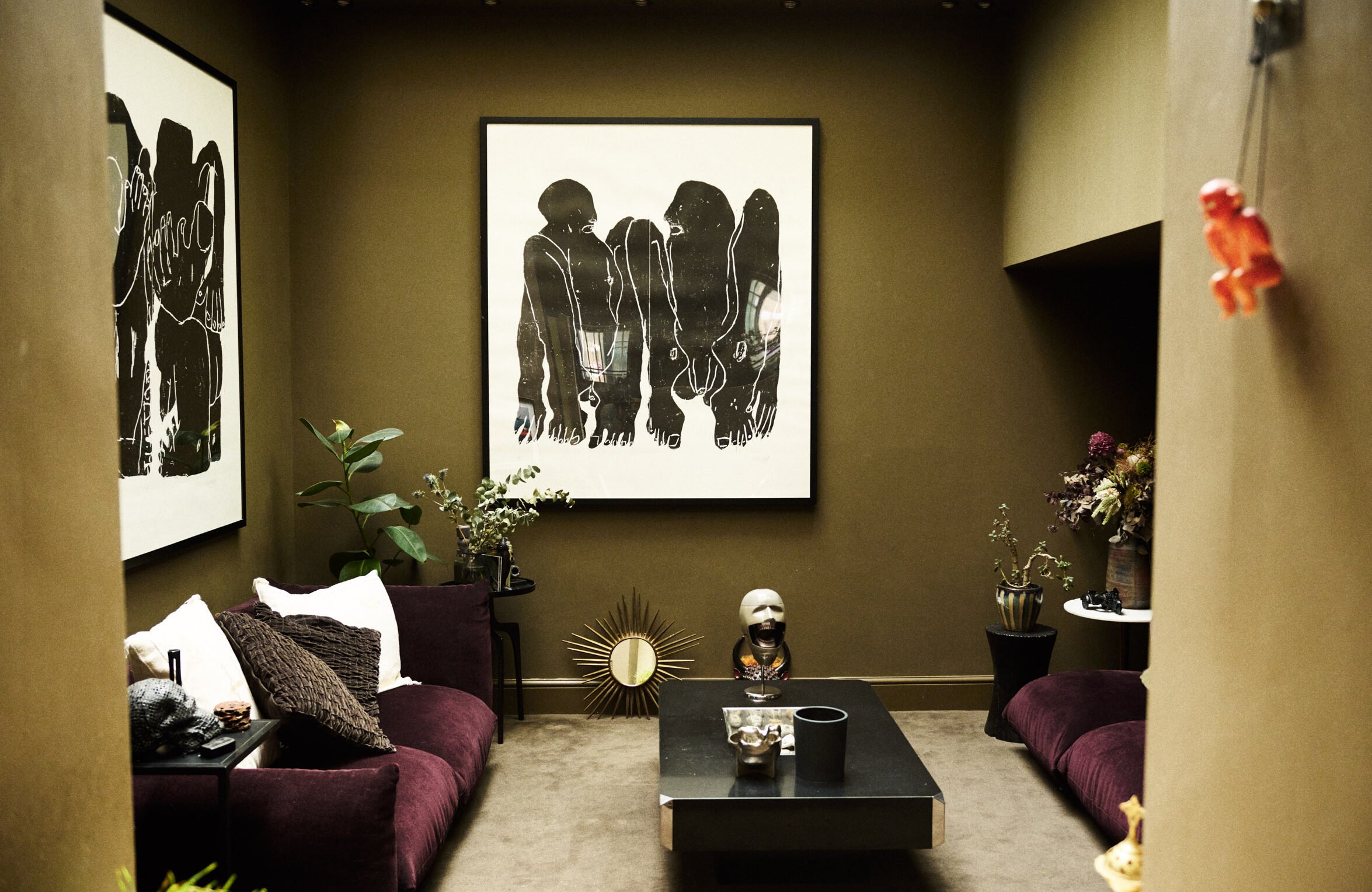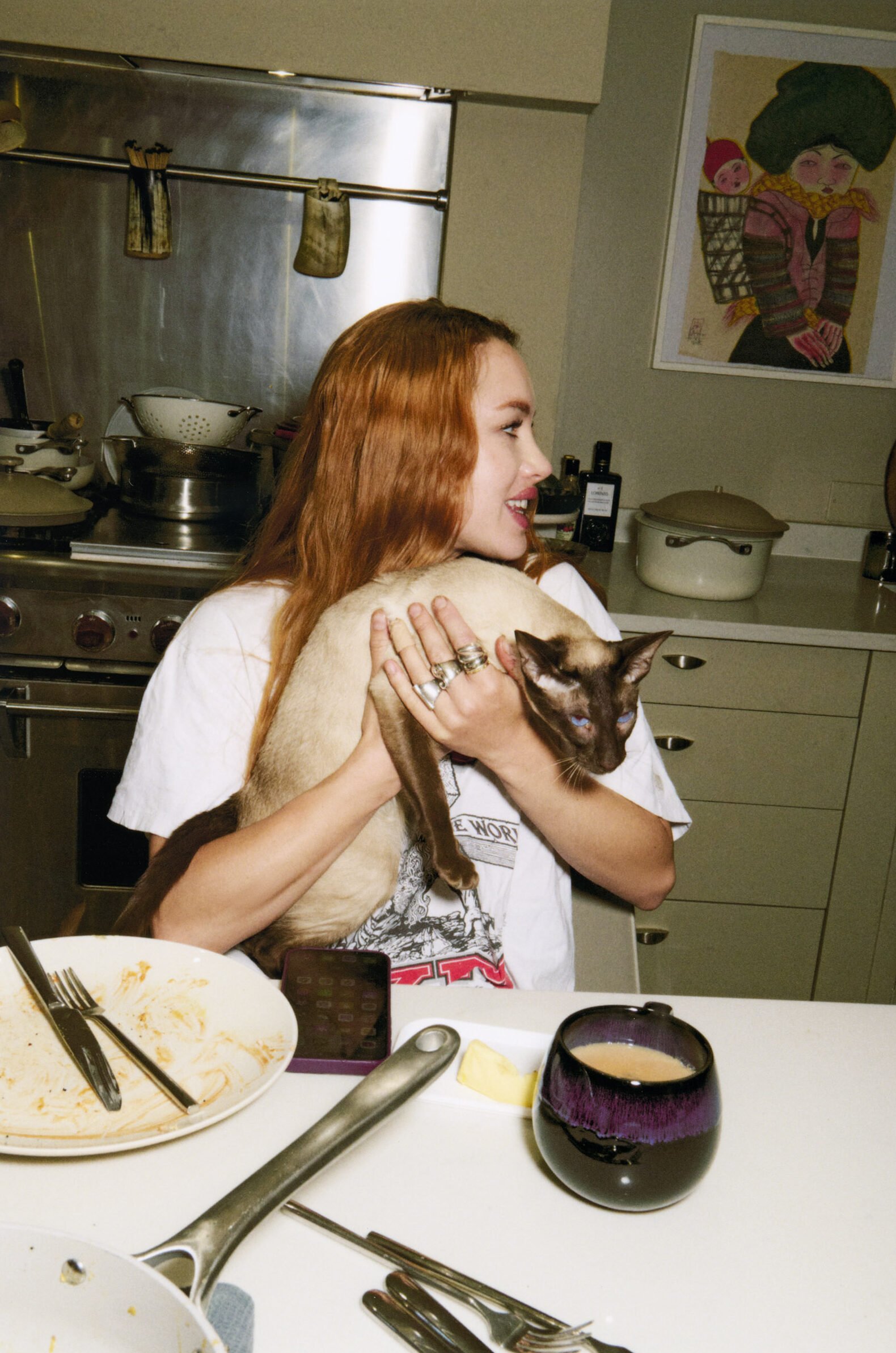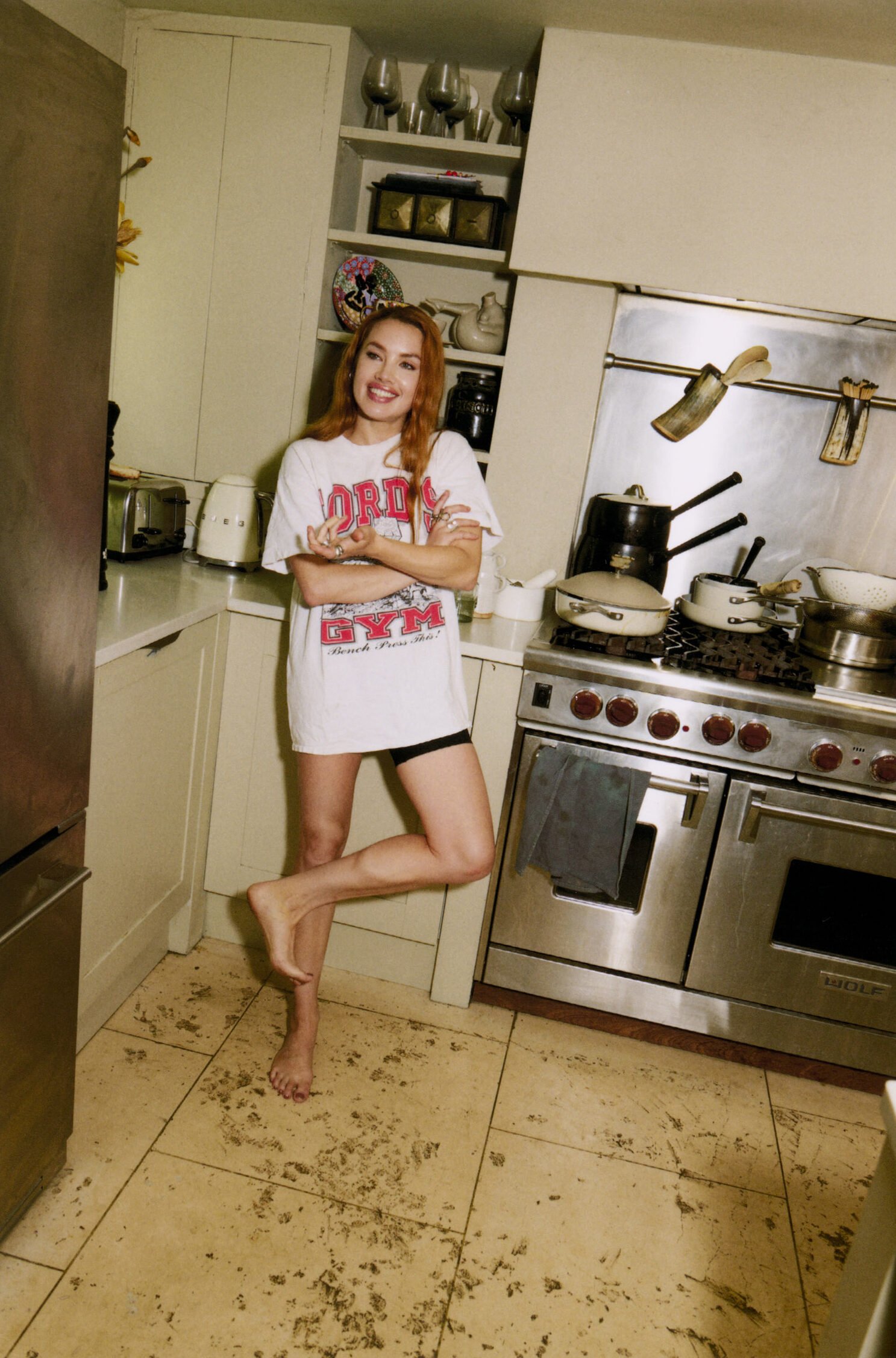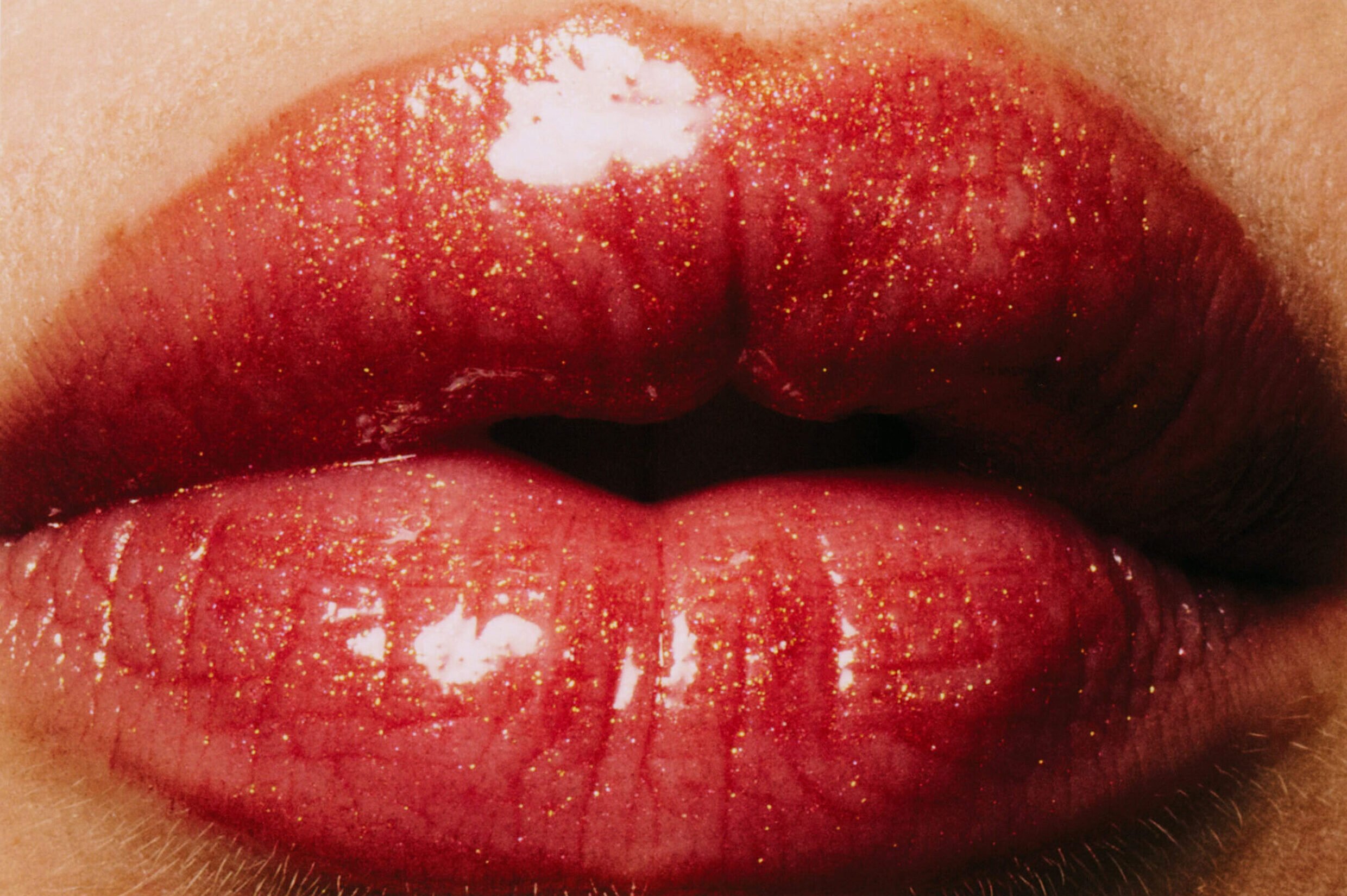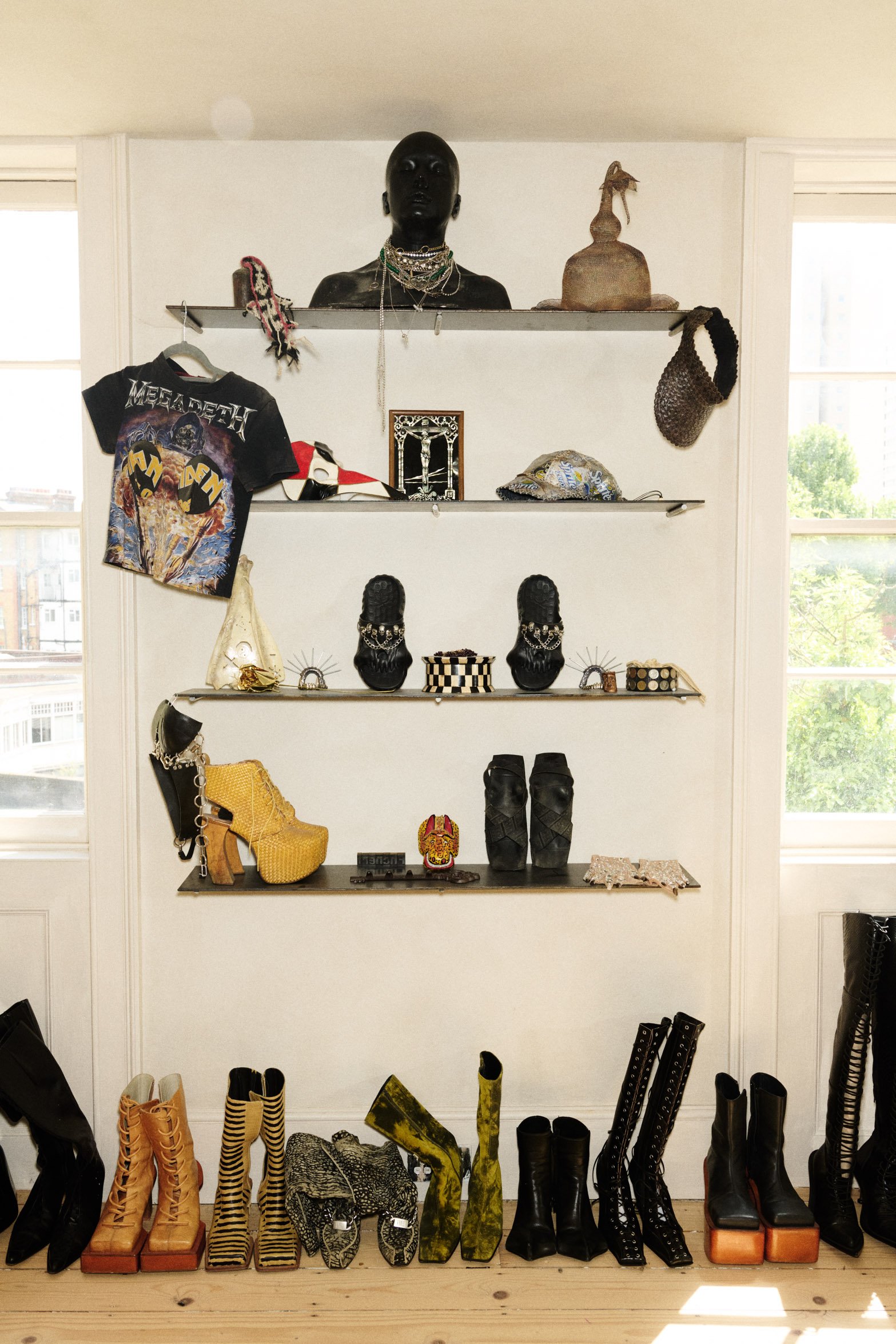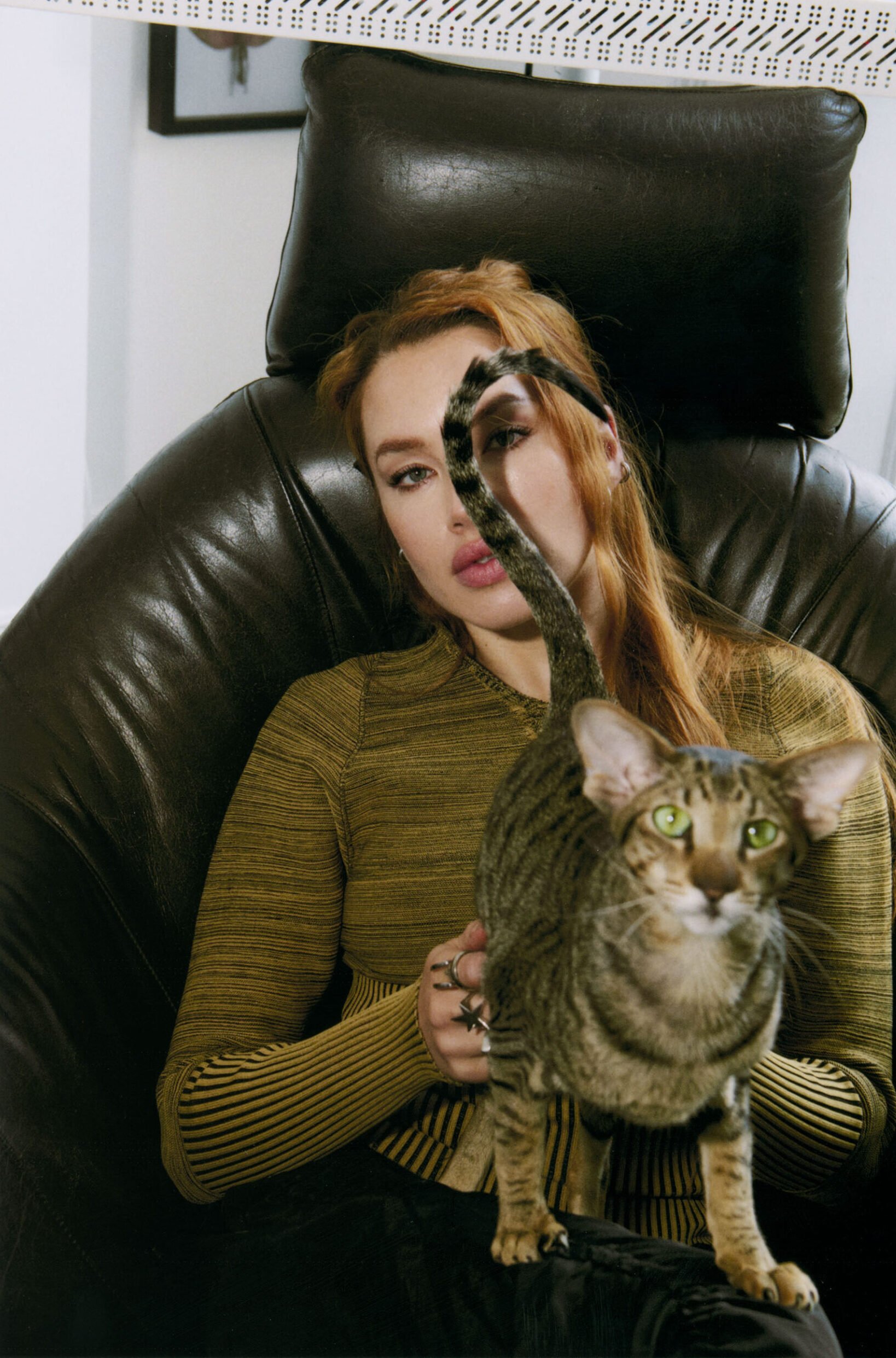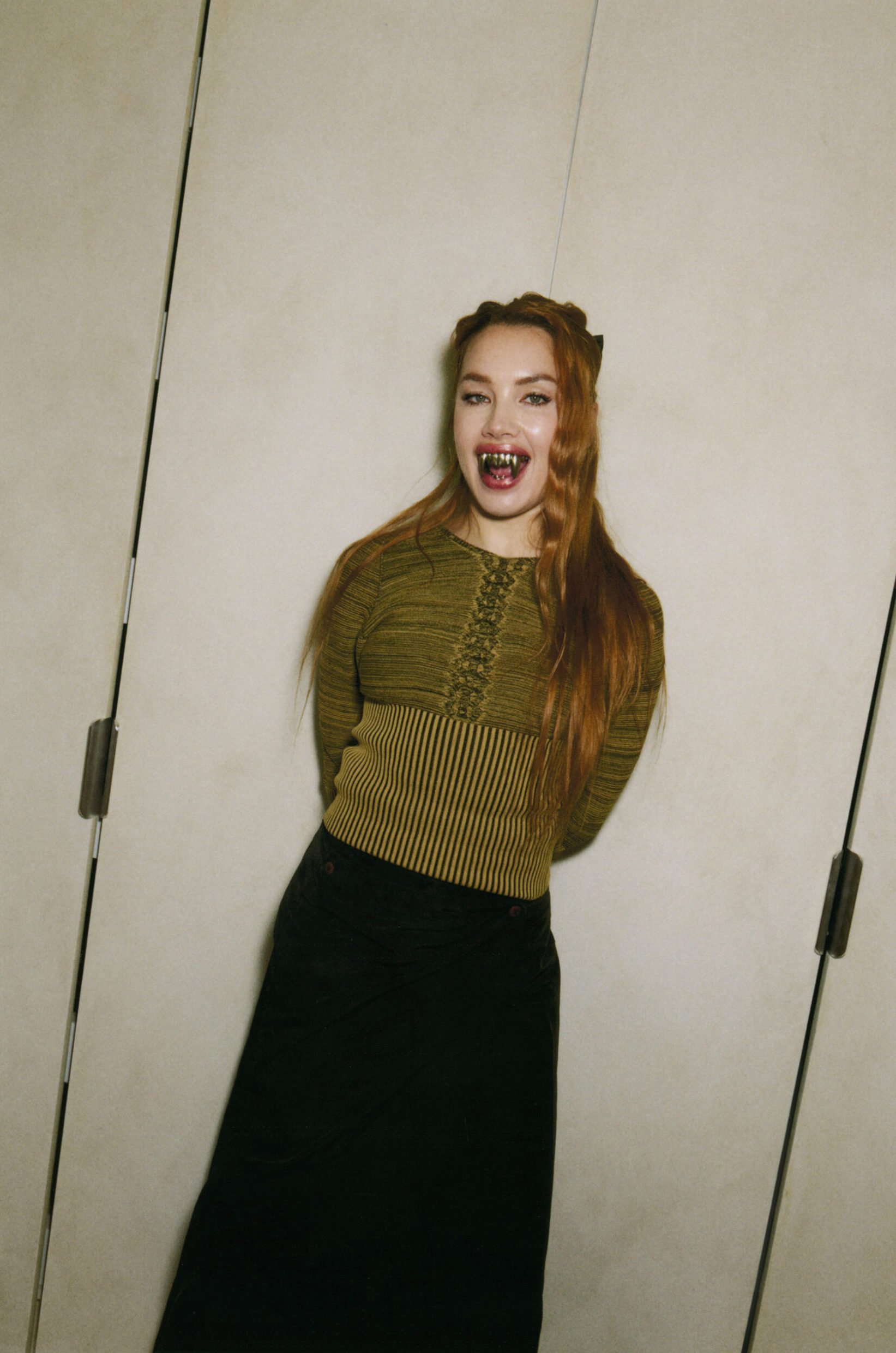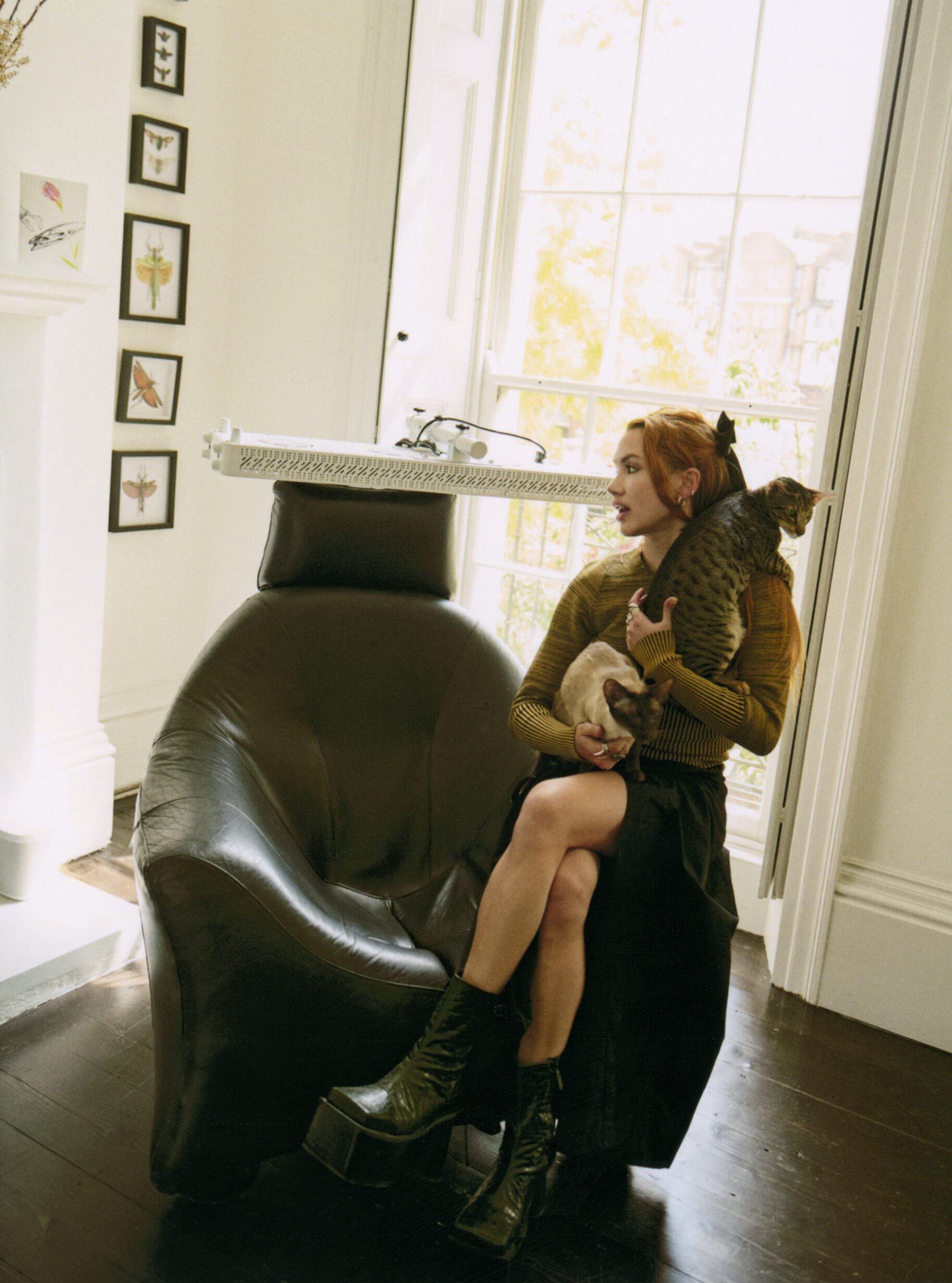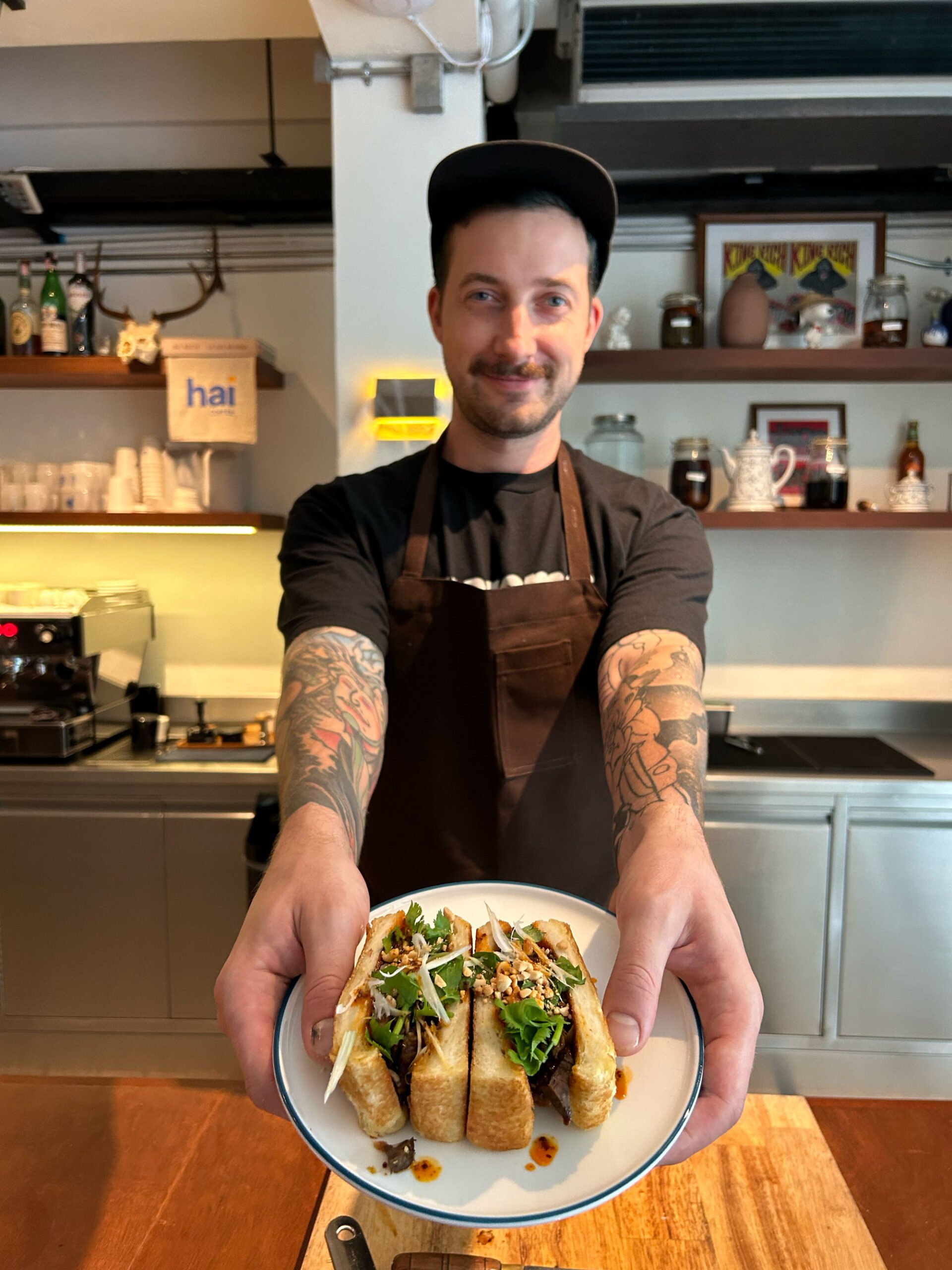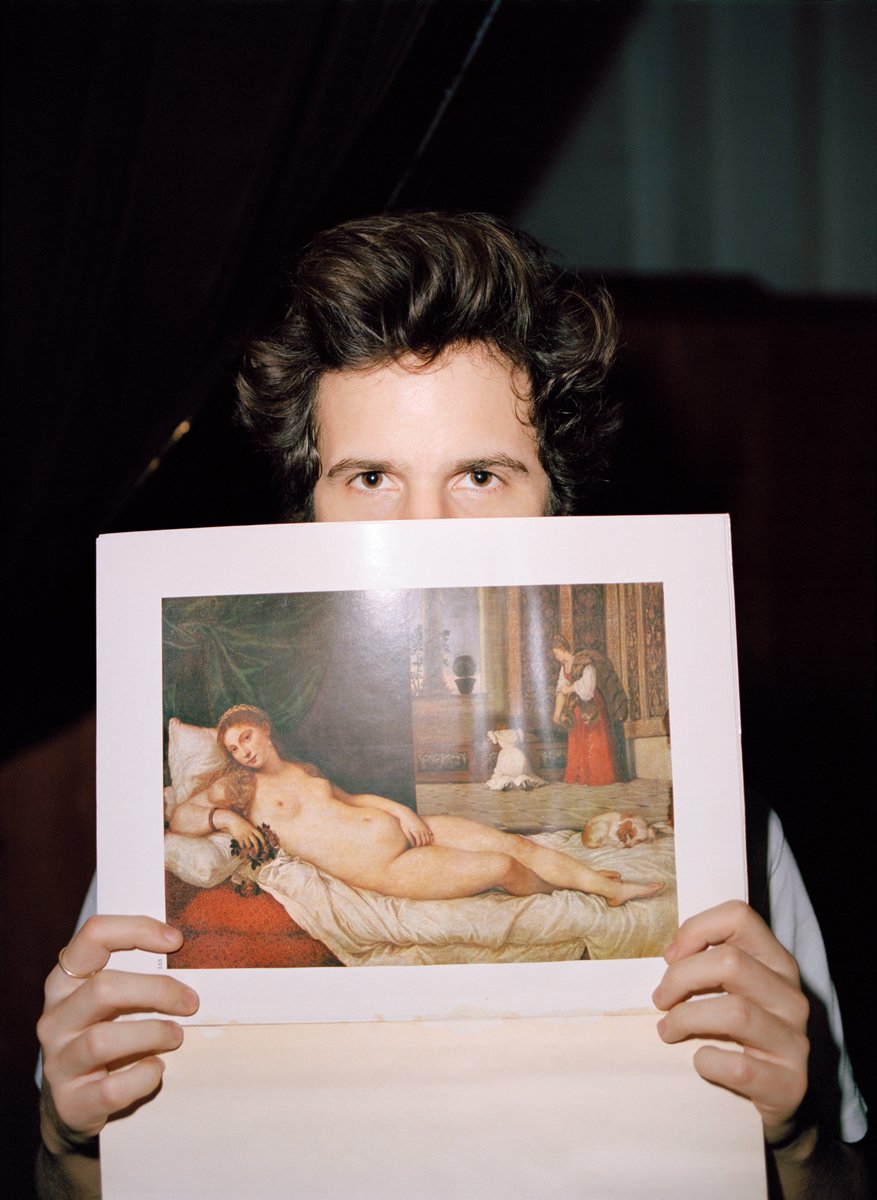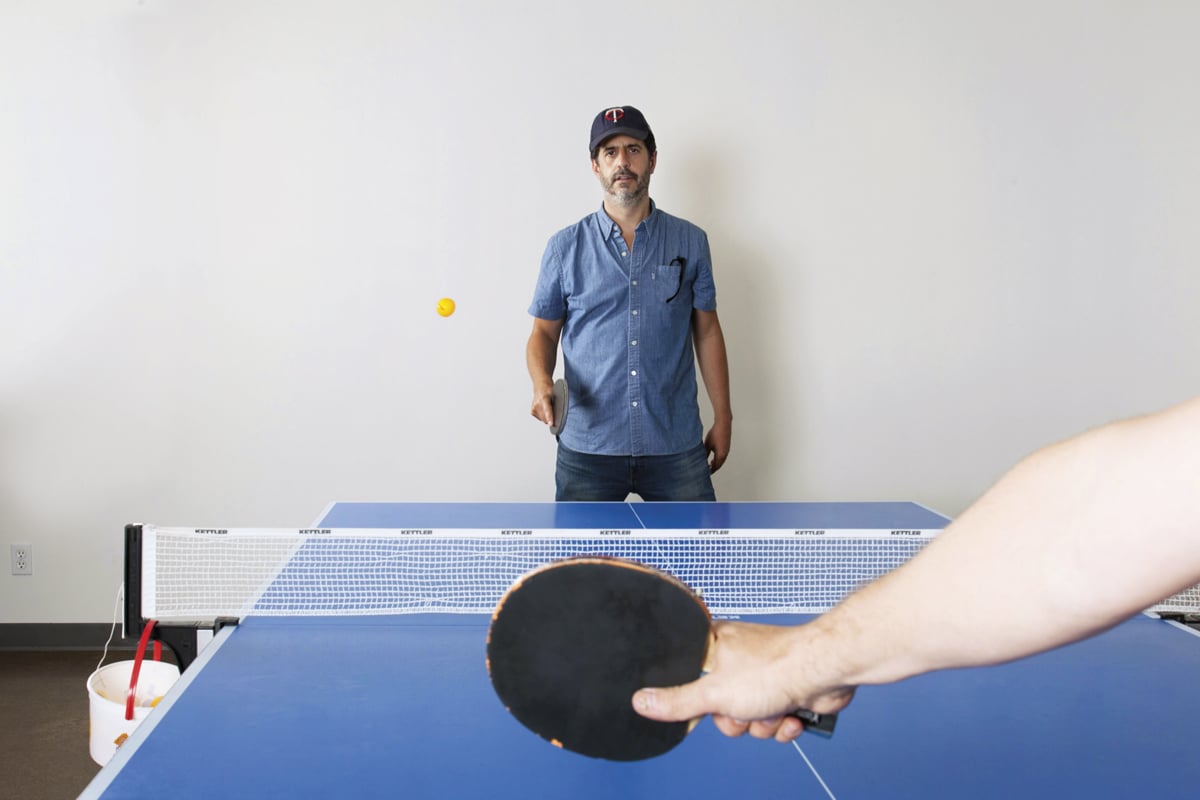London: Isamaya, the eponymous cosmetics line helmed by the avant-garde makeup artist Isamaya Ffrench, is advertised with a three-word slogan that functions as a smart double-entendre: Beauty Without Restraint. On one level, its sly use of ‘restraint’ nods to the bondage-inflected aesthetic of the brand’s first collection, which included a mascara wand that came with a piercing recalling a Prince Albert. On another, the phrase could apply to Ffrench’s practice in general—one in which sadomasochism abuts science fiction, and traditional conceptions of attractiveness are banjaxed in favour of the new, the unfamiliar, and the gleefully perverse. The homogenising influence of what the New Yorker writer Jia Tolentino described, in 2019, as ‘Instagram Face’ has stripped something vital from our present-day image of beauty: the dirt, flaws, and one-off freakeries necessary to produce a face that is memorable, wholly individual, and actually hot. Ffrench, who has used body-enhancing prosthetics in her runway and editorial work, is not only unconstrained by outdated ideals of pretty, palatable femininity—she’s also unconstrained by anatomy itself, and her eerie, erotic reimaginings of the human form occasionally remind me of a quote from Party Monster, the 2003 film about the Club Kids of ‘80s New York: ‘If you have a hunchback, just throw a little glitter on it, honey, and go dancing!’ When I visited her East London home, I was particularly struck by her collection of vintage dental phantoms: mannequin-style heads made of metal, each baring a set of realistic-looking dentures. Of all the pieces in her Wunderkammer of a house, these seemed to me to be the most coolly reflective of her unique sensibility: at once futuristic and gothic; human and posthuman; gorgeously masklike and sleek, but with teeth that looked capable of breaking the skin.
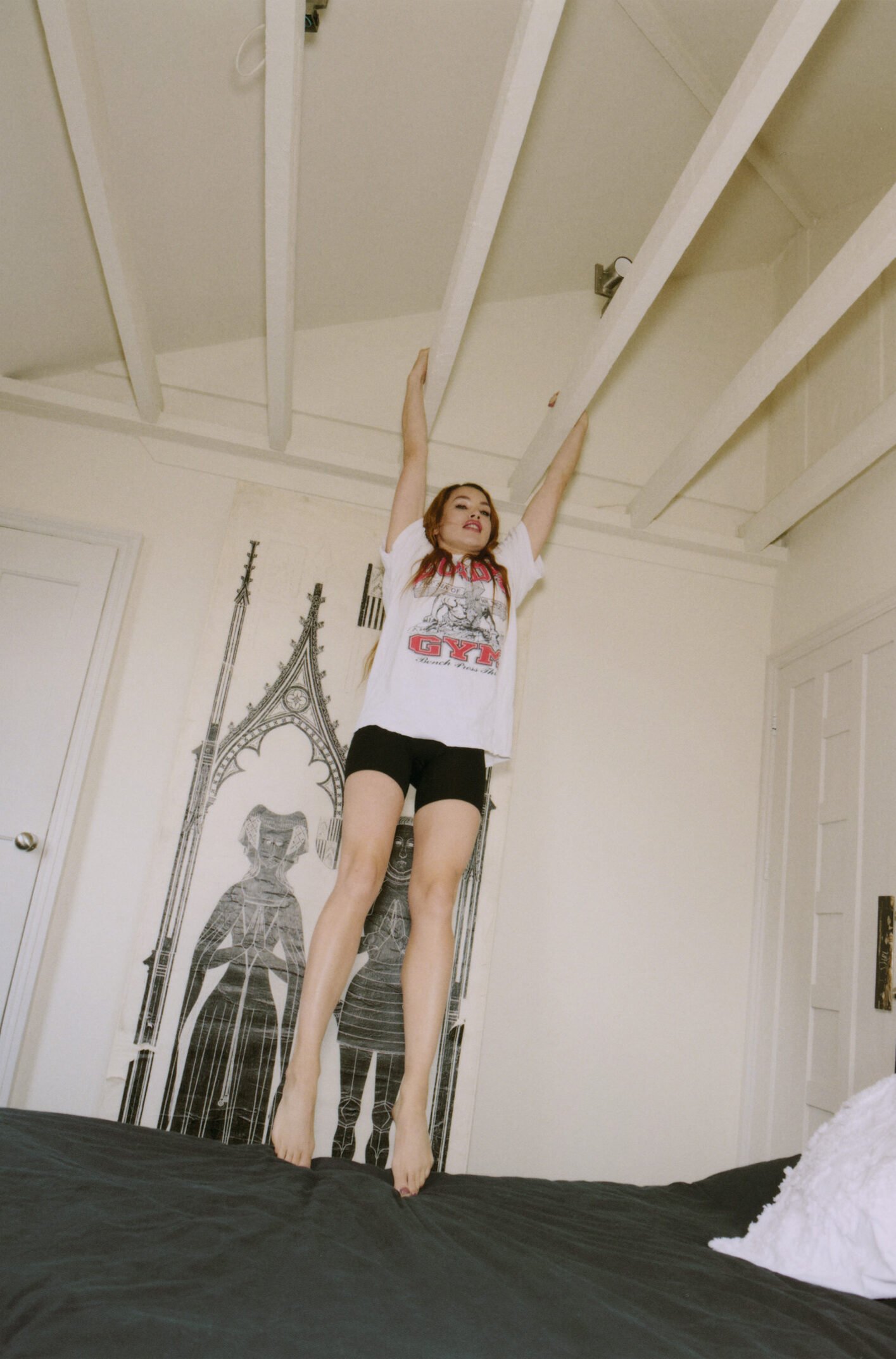
A conversation with Isamaya Ffrench for Apartamento Magazine Issue #36
This is a niche question to start with, but you grew up in Cambridge and then moved to London for university. I’m from Bournemouth, but I moved to London around the same time you did, and I went to University of the Arts London too. I was wondering whether, back then, you were also going to clubs like Boombox?
Not really, actually! I knew they were going on, but I never felt particularly drawn to them. I didn’t feel like there was any hidden side of myself that I needed to express. I’ve always felt a bit inauthentic, dressing up too much. And I was going to different kinds of raves.
I ask because I think that was the first place that I saw super-extreme makeup in real life. I really like, though, the idea that you haven’t felt the need to do outré beauty looks yourself. I’m intrigued by this almost ascetic separation between you, the artist, and your work. Would you say that your day-to-day relationship with beauty is quite functional?
Totally. I never do big looks because it just doesn’t make sense for me. I think that people expect me to, but most of the time I’m just at home, walking around the house barefoot. I grew up in a heavily masculine environment—my whole family are engineers, apart from my mum. The only tangible early beauty experience I had was with this Kevyn Aucoin book I found when I was about seven, which I was totally transfixed by. And I’ve always been interested in art. Fashion magazines, I did and do have some interest in, obviously, but I’ve struggled with that world because it’s just not deep enough. It’s transient; it’s about trends. I think also, as someone who grew up doing a lot of sport and being outdoors all the time, if I can’t go on a hike in it, then it doesn’t fall in line with my lifestyle.
With a lot of makeup artists, you might say that they have a set aesthetic, but I’m guessing you don’t have any one person in your head who is, to use magazine parlance, ‘the Isamaya woman’?
No, I don’t. I grew up feeling like I was completely styleless, which allowed me to transmute across many different styles. And I love worldbuilding; I love characters. Maybe that comes intuitively, or maybe it comes from the product design degree that I dropped out of—this thing where you have to get behind somebody else’s brand or aesthetic, and then creatively extend that vision. I love people like Serge Lutens, who had a very specific vision that wouldn’t be acceptable these days because he fetishised Asian women. He’s very inspiring, but that’s because he’s so truthful to his world and his preferences. Or designers like Luigi Colani, or Pater Sato. I do really love strong points of view—I just don’t know that I’ve ever had one. I can’t put my finger on the defining quality of my work.
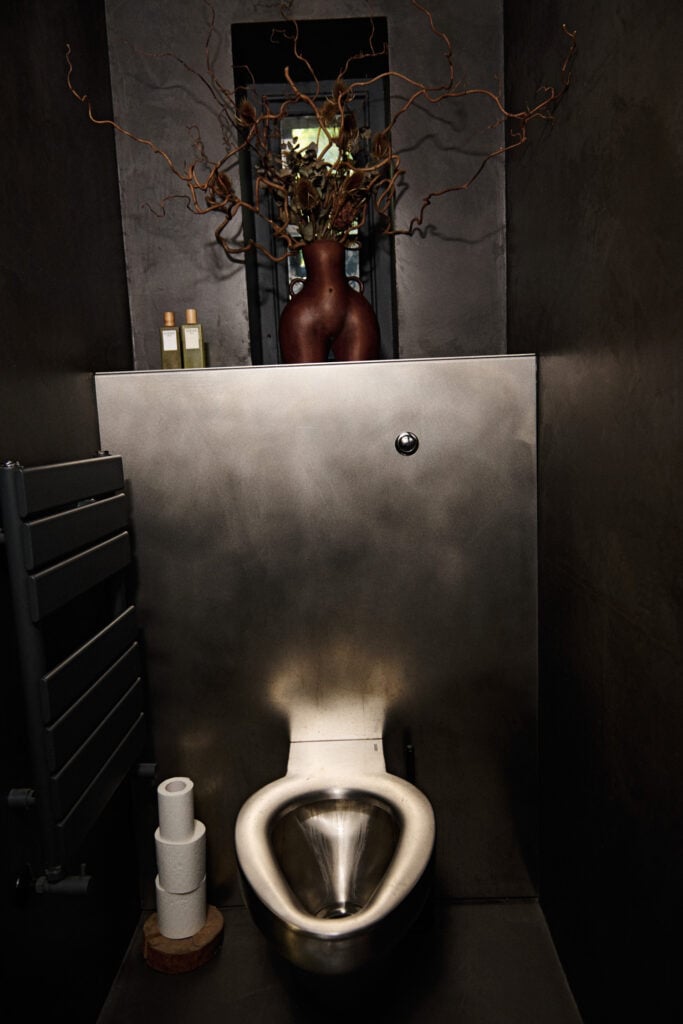
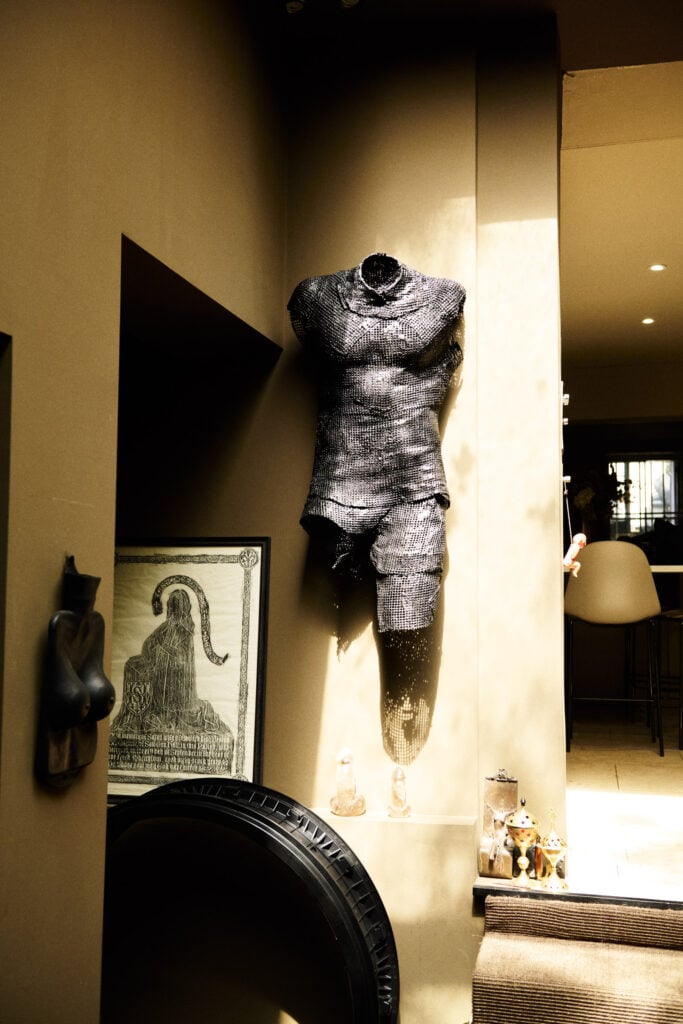
In some ways, it’s generous not to specify because it gives the audience freedom to project. When I studied photography, I was really into Helmut Newton and Guy Bourdin, who also had very singular styles and very specific ways of portraying women. That’s interesting, for sure, but it’s also—
Limiting!
Exactly. It’s fun when an artist is a shape-shifter. I’m guessing the fact that your self-presentation is so clean leaves space so that, when you’re in your campaigns, you can try on different skins. Does it feel like playing a character when you’re working with yourself as the model?
Funnily enough, I just did another interview that was strictly about makeup, and they asked me: when do you feel most like yourself? I do change my hair colour constantly, and I change my eyebrow colour and shape, but I don’t think there’s any single thing that defines my look. It’s more that I need to feel very much in the moment, wherever I am.
With regards to newness, there’s this tendency in media and culture to talk about developments in beauty in terms of them being empowering or disempowering. But there are aesthetic trends that I find myself drawn to from a sort of science-fictional perspective, or an artistic perspective, rather than from one where I’m considering whether they’re a net good for women or not. I feel like it might be the same for you. This is a huge question, but what do you think the future of beauty looks like, and do you think it involves more body modification than it used to?
I’m actually making a documentary about this question. If you look at beauty over time, and the things that have cemented a certain desirable aesthetic, it tends to occur at the intersection between wealth and fertility. We can’t escape the fact that we are reproductive creatures who prefer symmetry. We also have to consider what that looks like from a cultural perspective: so, larger females being desired in the Renaissance period because they could afford to eat, then that shifting to being ultra-skinny as a marker of beauty. The Kardashians have been a great example of this stuff, because how many grandchildren does Kris Jenner have now? Twenty?
I’ve lost count.
Right! They are the perfect representation of wealth and fertility. They embody that classic feminine totem shape of big hips, big breasts. The question, then, is how do we move forward from that intersection being the focus? If we’re talking in terms of desire, as opposed to just aesthetic preference, one thing that’s happening globally is what I’ve been calling ‘showing your DNA’—Oura Rings, Apple Watches, people being able to see how much metal they have in their bloodstream. All these things that we can now record. If we see health as proof of desirability, and you’re able to somehow demonstrate your good health, that makes you potentially more attractive to others.
I would never have thought about that stuff as being related to the beauty industry, but it makes sense—our exterior is a barometer for our interior, and health is, as you say, a marketable status symbol now.
And culturally, health and fertility have been connected for a long time. I don’t know in the long-term how all this will express itself. I think whatever it looks like, the wealthiest people in the world will end up having more exclusive access to it, and that will end up shaping our idea of what’s attractive. It’s a weird one! It’s not something where we can say, ‘The future will look like shaved eyebrows, or it’ll look like a big bum’.
You mentioned Kim Kardashian: I think she’s also a perfect example of a subject of these discussions about whether something is good or bad for women, and I haven’t really decided about her yet. I do think she’s a really—
Important figure in the culture!
Exactly, and this cyborgian self-transformation stuff she does constantly is so interesting to me.
I think with regards to her perceived substance, or lack of substance, there are a lot of people who really do not care about her—my sister, for example, who’s an engineer, would not really think about Kim Kardashian. But you’re right that she’s had many chapters. And maybe the truly authentic part of her is that she’s incredibly authentic to her commercial self.
A version of herself that is the brand ‘Kim Kardashian’. I’m also intrigued by her from a male-gaze perspective. Do men find her attractive? Or is it about selling products to other women? I’m sorry, we don’t have to make this interview exclusively about the Kardashians.
I think men might say that they do, but it would be in such an objectifying, detached way that there’s no real emotional investment in the answer. It’s sort of: big tits, big bum, symmetrical face, what’s not attractive there?
If you had to sketch a woman very fast on a napkin, you might end up sketching Kim Kardashian.
And once, you might have ended up drawing Marilyn Monroe, and a long time before that, maybe Helen of Troy. Kim’s quite overwhelming, though, isn’t she? I don’t know what men would do with that.
I hesitate to talk too much about my own books—
No, I love it.
But I’ve written about her before as a performance artist, almost like Orlan—do you know Orlan?
Of course.
Obviously, I don’t know why I’m asking you that, of all people.
I did her makeup once, she’s really lovely.
But you see what I mean? They’re both people where the refinement of their body is this major form of beauty-based performance.
I can shut up about the Kardashians as well, if you’d like me to! But it’s astonishing how they’ve managed to remain somewhat interesting and relevant. And they’ve been shaping our ideas about beauty for a long time. You might know this already, but working on the documentary, something I’ve learnt is that ‘looking the part’ or ‘fitting in’ is historically so much more important for women than it is for men because of our tribal ancestry. Your life could depend on it. There’s this thing of needing to conform to a certain standard or ideal because it keeps you safe. Men don’t have that same inherent need to relate to and look like each other.
I was thinking the other day that I wonder if people who appear in reality television now have a bigger effect on the beauty standard for average women than film stars do. I live in Norwich now, and on the high street, you’ll see a lot of women who have that…
Love Island look.
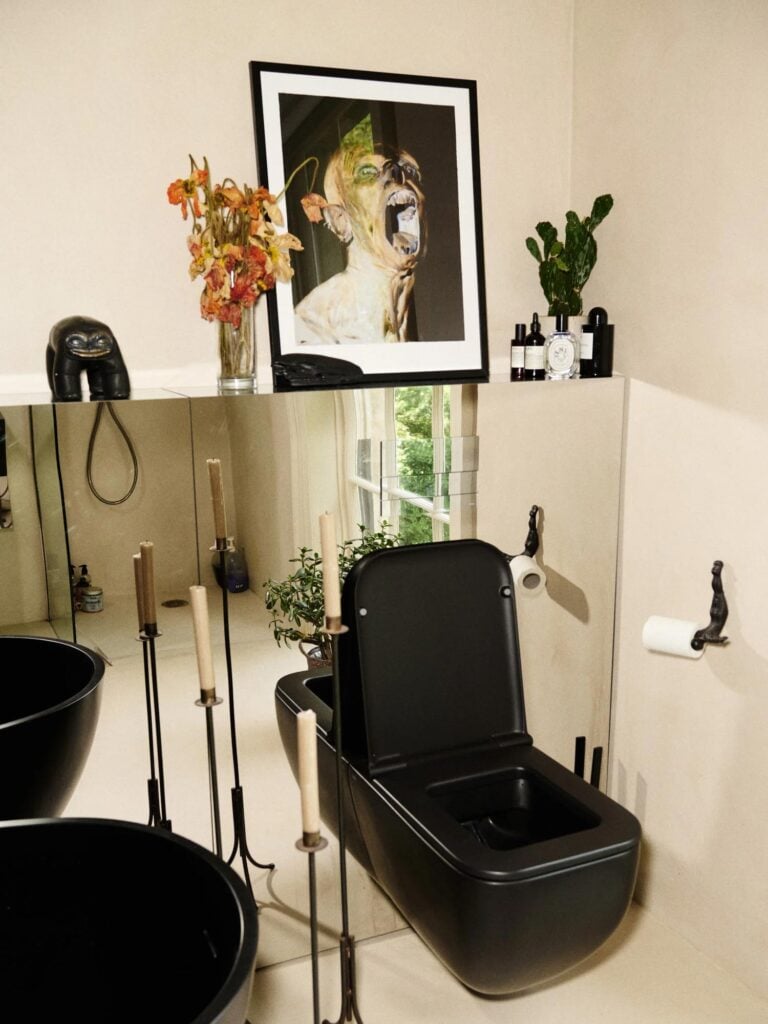
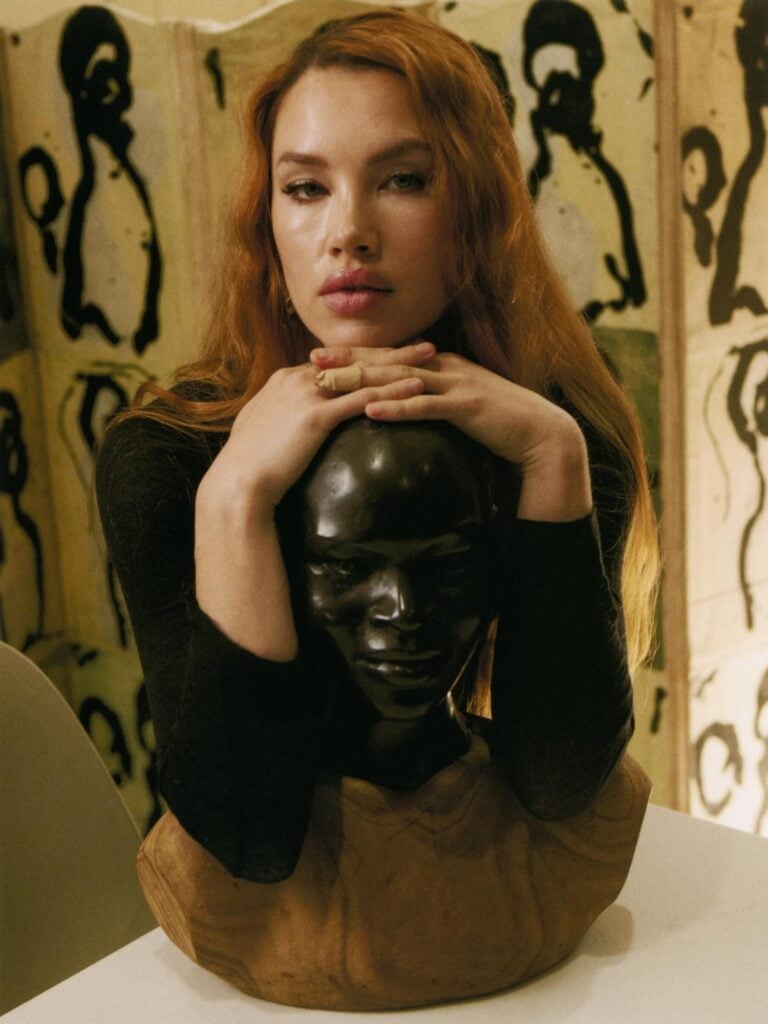
A Love Island face, yes. It’s not even necessarily about looking young. I remember there being a controversy around the contestants a year or two ago because people on social media were saying they seemed old—but it’s less about youth than about having these very specific proportions.
That’s what’s quite—I was going to say ‘disarming’, but I think ‘mad’ might be a better word for it. Because again, it’s that thing of copycatting, but not even knowing why you’re doing it. And also, I don’t know whether that aesthetic is really intended for men because I don’t know that men even like things like big injected lips, particularly.
It becomes a question of who these women are performing for, and I think the answer is ‘each other’. It’s reflective of this desire we have to all be part of the same, bigger thing, because that’s advantageous. I really think there’s something a lot deeper and more primal going on there.
I wonder if reality TV has become a dominant influence precisely because it purports to be real, so it’s seen as offering us a truer reflection of what’s ‘normal’, and thus possible, than cinema is.
I will say, increasingly, I think people want more authenticity. I don’t really post much makeup on my account anymore, because I don’t think anyone really cares. They want to see what I’m doing in my garden, or they want to see my cats. Things like that offer a sense of realness we can tap into as we get more disconnected from one another. But you’re right, films present themselves as totally artificial, whereas reality TV presents itself as being able to offer you a way into stuff that’s really happening.
As someone who’s been around a lot of celebrities, what would you say is the big difference between celebrities and normal people? Aside from a lot of money, obviously.
You know, as clients, I actually don’t think there is much of a difference. Ten years ago, someone would sit in your chair, and you would be in control because you were the professional. But I think what’s happened now because of social media, and because of this very curated version of the self that people present, is that someone will come to the chair and say, ‘I don’t want that, I do want this’. So now I have to contend with people’s preferences—and that’s OK! It can be annoying if I have a particular look to execute. Say I’m doing a show: Ten years ago, all 20 models would have the same look. Now you do a show, and you hear, ‘I don’t want that, it doesn’t look good on me’. And you think, you’re a model! Isn’t this the job? So the dynamic has changed. Both celebrities and normal people do that now, too.
For the last 40 minutes, I’ve been fighting the urge to ask what Rihanna is like.
It should have been the first thing you asked!
OK: what’s Rihanna like?
Honestly, Rihanna is Rihanna. She’s got a big spliff in her hand. She turns up 10 hours late to the shoot. But when she brings it, she really brings it. I imagine she is Rihanna in exactly the same way that Mariah Carey is Mariah Carey. I like people who are totally themselves. The more of a character you are, the more interesting you are to me.
I agree. I also can’t tell you how relieved I am to hear that Rihanna lives up to her projected Rihanna-ness. You mentioned your documentary a few times—could you tell me a bit more about it?
It’s exploring where our beauty standards come from. I’ve been working on it for ages, although it was on pause for a bit while I developed the brand. Beauty ideals are forever evolving. I’m thinking about what happens when—if—fertility becomes unnecessary; then how do we define beauty? As we learn that we don’t need to reproduce, necessarily, will things shift entirely? If you got rid of the instinctive part, the evolutionary by-product, then what?
You only need to think about the degree to which society has changed in reaction to women no longer being regarded as only being machines for making children. If we didn’t need to think about fertility at all anymore? Who knows.
I think it’s already happening. One thing we’ve touched on in this conversation is the idea of women reshaping themselves for other women, instead of men. I think that phenomenon feels very contemporary, and it must be linked to what you’re talking about in terms of women’s roles being different.
We’ve talked a lot about interiors and exteriors as far as the body is concerned, but we should probably close by discussing the actual interior of your house. I wonder whether you have any particularly talismanic objects here—pieces that have inspired you, or items that relate to your work?
Oh, I have loads. I gravitate towards things. I would say I’m a collector, but there’s no rhyme or reason to it, other than the fact I feel as though everything holds a specific energy. A lot of my work is inspired by things I find on my travels. That’s a Mongolian brass-plate mask, and then here I’ve got a lovely big penis-shaped door knocker on display. And I also collect dental phantoms.
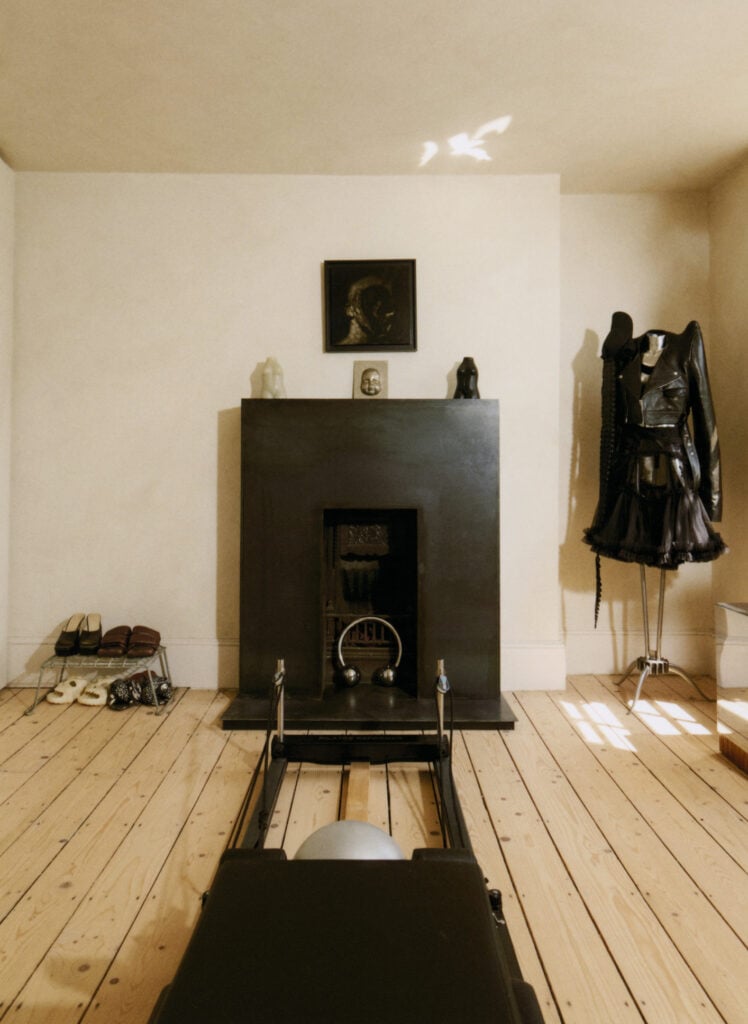
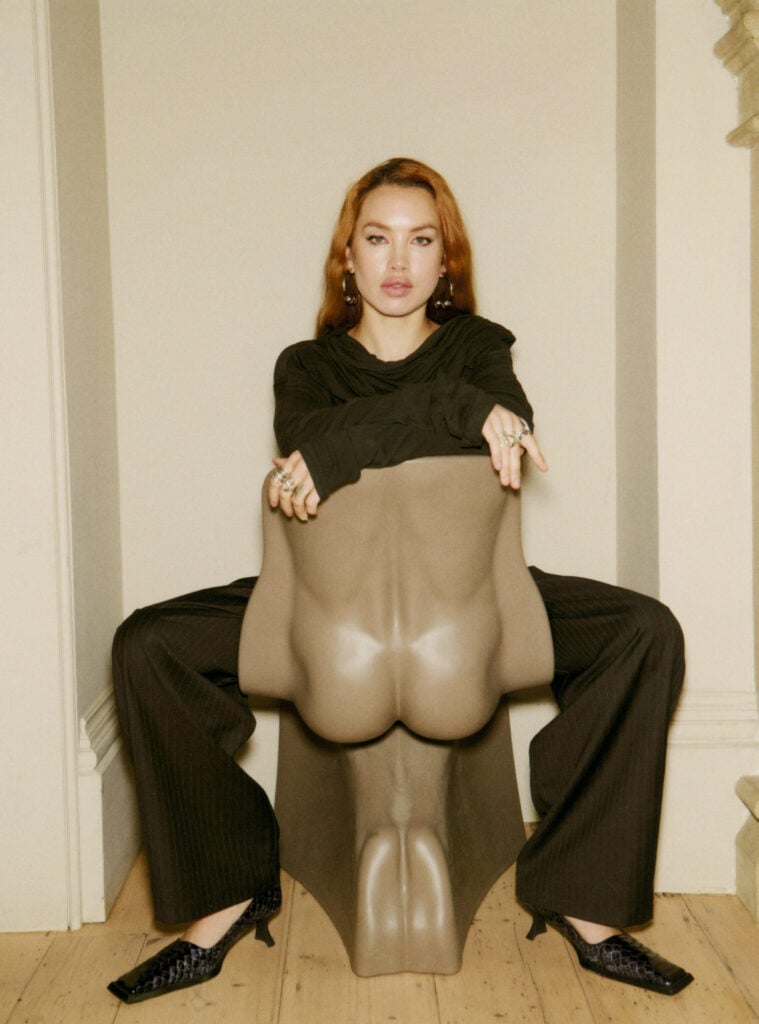
They’re like a cross between an H.R. Giger sculpture and one of those Barbie heads that children learn to do makeup on.
That’s probably the best description of them I’ve ever heard.
I’m looking at this painting of a car wreck hanging next to us, and I’m mesmerised. Who is the artist?
That’s by a painter called Phil Hale—I have five of his paintings around the house. He’s become a really good friend of mine, and he’s such an important artist. His pieces have these clashing ideas and environments in them, and he works a lot with collage. This is quite a dark painting, but I have to say I tend to be drawn to darker things.
Me too, maybe obviously. This one reminds me quite a lot of Andy Warhol’s Death and Disaster series.
Phil paints car crashes a lot, actually. Car crashes and dogging.
Nice! Very Ballardian.
Two of my favourite things.
 close
close
















